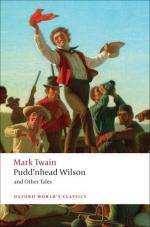4. The Jews have no party; they are non-participants.
5. Will the persecution ever come to an end?
6. What has become of the Golden Rule?
Point No. 1.—We must grant proposition No. 1, for several sufficient reasons. The Jew is not a disturber of the peace of any country. Even his enemies will concede that. He is not a loafer, he is not a sot, he is not noisy, he is not a brawler nor a rioter, he is not quarrelsome. In the statistics of crime his presence is conspicuously rare—in all countries. With murder and other crimes of violence he has but little to do: he is a stranger to the hangman. In the police court’s daily long roll of ‘assaults’ and ‘drunk and disorderlies’ his name seldom appears. That the Jewish home is a home in the truest sense is a fact which no one will dispute. The family is knitted together by the strongest affections; its members show each other every due respect; and reverence for the elders is an inviolate law of the house. The Jew is not a burden on the charities of the state nor of the city; these could cease from their functions without affecting him. When he is well enough, he works; when he is incapacitated, his own people take care of him. And not in a poor and stingy way, but with a fine and large benevolence. His race is entitled to be called the most benevolent of all the races of men. A Jewish beggar is not impossible, perhaps; such a thing may exist, but there are few men that can say they have seen that spectacle. The Jew has been staged in many uncomplimentary forms, but, so far as I know, no dramatist has done him the injustice to stage him as a beggar. Whenever a Jew has real need to beg, his people save him from the necessity of doing it. The charitable institutions of the Jews are supported by Jewish money, and amply. The Jews make no noise about it; it is done quietly; they do not nag and pester and harass us for contributions; they give us peace, and set us an example—an example which he have not found ourselves able to follow; for by nature we are not free givers, and have to be patiently and persistently hunted down in the interest of the unfortunate.
These facts are all on the credit side of the proposition that the Jew is a good and orderly citizen. Summed up, they certify that he is quiet, peaceable, industrious, unaddicted to high crimes and brutal dispositions; that his family life is commendable; that he is not a burden upon public charities; that he is not a beggar; that in benevolence he is above the reach of competition. These are the very quintessentials of good citizenship. If you can add that he is as honest as the average of his neighbours—But I think that question is affirmatively answered by the fact that he is a successful business man. The basis of successful business is honesty; a business cannot thrive where the parties to it cannot trust each other. In the matter of numbers the Jew counts for little in the overwhelming population of New York; but that his honest counts for much is guaranteed by the fact that the immense wholesale business of Broadway, from the Battery to Union Square, is substantially in his hands.




